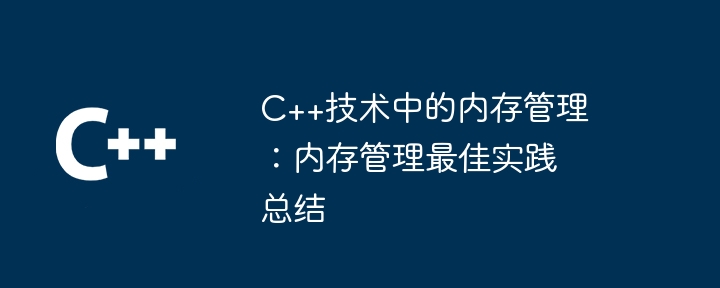
Memory management is crucial in C, and following best practices can avoid problems such as memory leaks and data corruption. These practices include: Automating memory allocation and deallocation using smart pointers such as unique_ptr and shared_ptr. Avoid using new and delete and use smart pointers instead. Apply Resource Acquisition Initialization (RAII) to associate resource lifetimes with creation blocks. Monitor memory allocations using a memory debugger or tool such as Valgrind.

Memory Management in C Technology: Summary of Best Practices
Memory management is a critical task in C programming. Improper implementation can lead to memory leaks, data corruption, and other problems. To avoid these problems, it is crucial to follow best practices.
1. Use smart pointers
Smart pointers (such as std::unique_ptr and std::shared_ptr) are the modern way of managing memory. They automate memory allocation and deallocation, preventing memory leaks and dangling pointers.
How to use smart pointers in code:
std::unique_ptr<int> p = std::make_unique<int>(42); // p 自动销毁指向的数据,当 p 退出作用域时
2. Avoid using new and delete
new and delete operators are low-level memory allocation methods . They are error-prone and introduce additional memory management overhead.
Use smart pointers to replace new and delete:
int* p = new int(42); // 避免这样做 std::unique_ptr<int> p = std::make_unique<int>(42); // 更好的做法
3. Use resource acquisition initialization (RAII)
RAII is a resource management method Convention where the lifetime of a resource is tied to the lifetime of the block of code in which it is created. This helps prevent memory leaks from forgetting to release resources.
How to use RAII:
class File {
public:
File(const std::string& filename) { /* ... */ }
~File() { /* ... */ } // 释放与文件相关的资源
};
void open_file() {
File file("filename.txt"); // RAII 管理文件资源
// ...
} // file 在此作用域内自动销毁4. Monitor memory allocations
Using a memory debugger or tool to monitor memory allocations can help identify potential memory allocations leakage. For example, Valgrind is a popular tool for detecting memory problems.
5. Practical case: preventing memory leaks
In our own applications, we have encountered memory leak problems. Analysis showed that the problem was caused by resources that were not properly cleaned. By applying smart pointers and RAII principles, we resolve memory leaks and improve application reliability.
Conclusion
By following these best practices, you can effectively manage memory in C technology. This will prevent memory leaks, data corruption, and improve the overall robustness of your code.
The above is the detailed content of Memory management in C++ technology: Summary of best practices in memory management. For more information, please follow other related articles on the PHP Chinese website!
 What are the differences between c++ and c language
What are the differences between c++ and c language
 Recommended learning order for c++ and python
Recommended learning order for c++ and python
 Cost-effectiveness analysis of learning python and c++
Cost-effectiveness analysis of learning python and c++
 Is c language the same as c++?
Is c language the same as c++?
 Which is better to learn first, c language or c++?
Which is better to learn first, c language or c++?
 The difference and connection between c language and c++
The difference and connection between c language and c++
 C++ software Chinese change tutorial
C++ software Chinese change tutorial
 Cost-effectiveness analysis of learning python, java and c++
Cost-effectiveness analysis of learning python, java and c++




